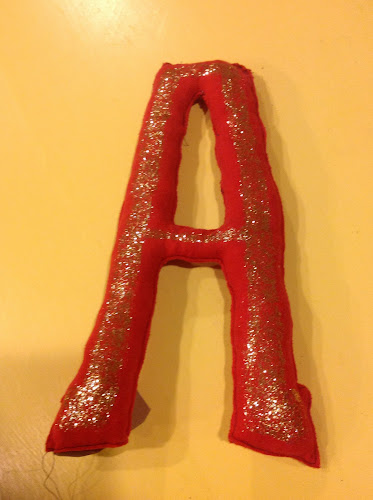My daughter read The Scarlet Letter in Literature class. Every year, the teacher gives extra credit to students who create their own crafty version of Hester's badge of shame. 17 told me that last year, one student used his father's welding equipment to creat a cast iron image of an A. I was going to knit one, she said, but another girl is already doing that. Ever her mother's daughter, 17 decided to make a pillow. This is why I came in from work to find her red IU sweatpants spread out on the dining room table, ready to go under the knife.
"Wait! Don't cut those. They are really nice. We can find something else for you."
"But I never wear them. Why does it matter?"
"If you don't want them, I can give them to the clothing bank at church."
In the end, we found some old red pants, and she kept her IU ones. While I made dinner, she layed her pattern on the fabric, pinned it in place and cut out two shapes. She sewed them right side out, because we could not figure out how to turn the shape right side out after stitching it (A's have that pesky hole in the center). She slid into the kitchen, Risky-Business style (fully-clothed), smiling and holding her Scarlet Letter over her head.
"Where is the pillow stuffing?" she asked.
I grimaced, not sure I had any, and not wanting to drive to the store, I wondered what else she could use.
Then I remembered the Sock Basket.
Before my husband and I blended into a family of nine, I had two pairs of running socks, which I washed and carefully reunited a couple of times a week. But less than a month into our marriage, one lonely sock remained in my possession. I held onto it, and occasionally another would turn up in the sock basket, the catchall for every mismatched sock in our house, but by that the time, the other one would have gone missing. Almost ten years later, our oldest kid teaches 6th grade English and lives on her own. Three of our kids are in college, and a fourth is visiting a college in Ohio today. Only two little monkeys will be jumping in the bed, and those two do their own laundry. So earlier that day, I had emptied the sock basket into a plastic bag, which sat at the bottom of the steps. I couldn't bring myself to throw it away. This is my curse. I hoard anything that I think can be used later. I should be forced to sew a single, unmatched sock on my clothing as a badge of shame.
When I plopped the bag on the table beside my daughter, she looked up at me and glared. But she took up her scissors and began to cut the socks first into strips and then little squares. 13 refused to help, on the grounds that she wasn't allowed to borrow 17's phone charger earlier that evening. I initially begged off (trigger finger, remember?) but after dinner came in to help. She shooed me away, saying that she didn't have anything else to do. When she was finished stuffing the pillow, she used gold glitter glue to recreate the elaborate embroidery Hester added to her letter.
When I came down to make tea the next morning, I found the pillow laying on the table. I picked it up; it had a satisfying denseness to it. What would the teacher do will all those Scarlet Letters, and what had become of all the letters from years past? And then I realized, I had not salvaged anything. Eventually everything must go.

